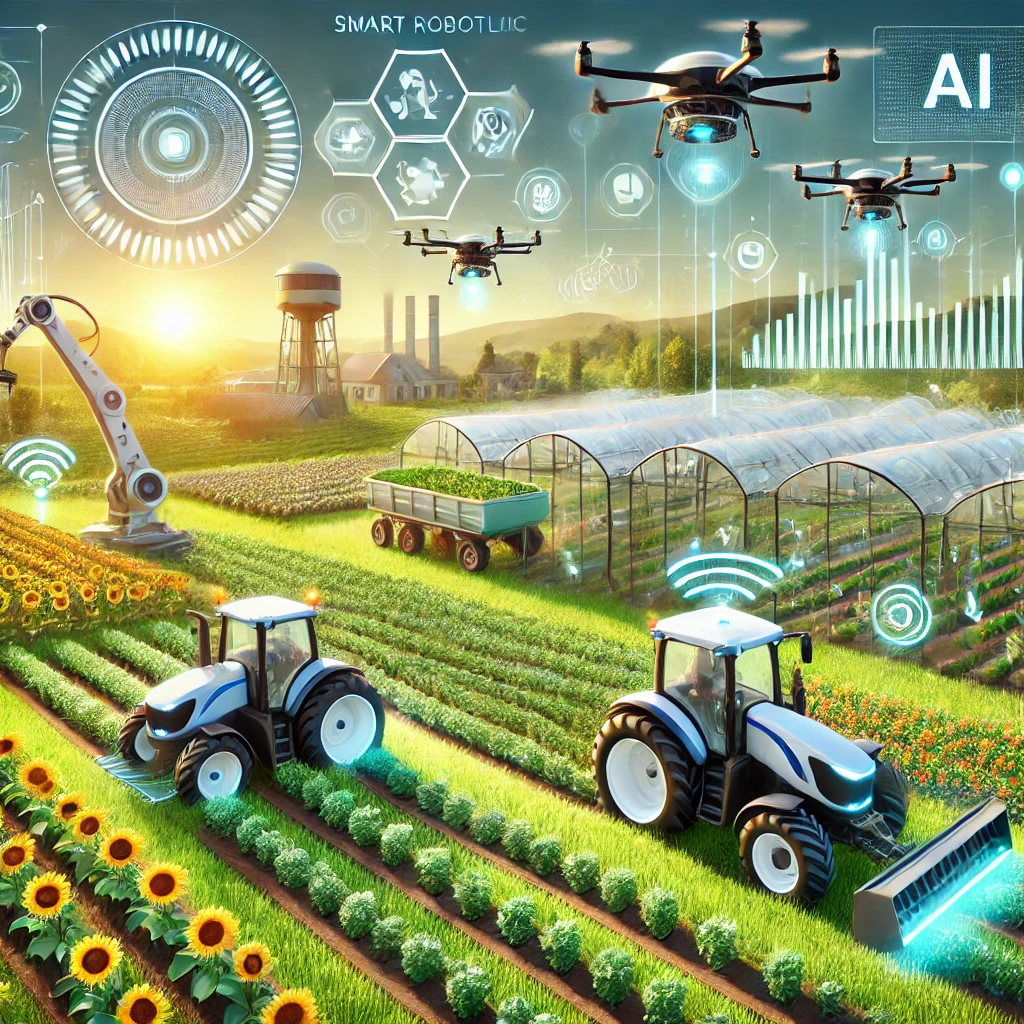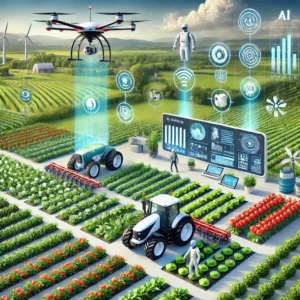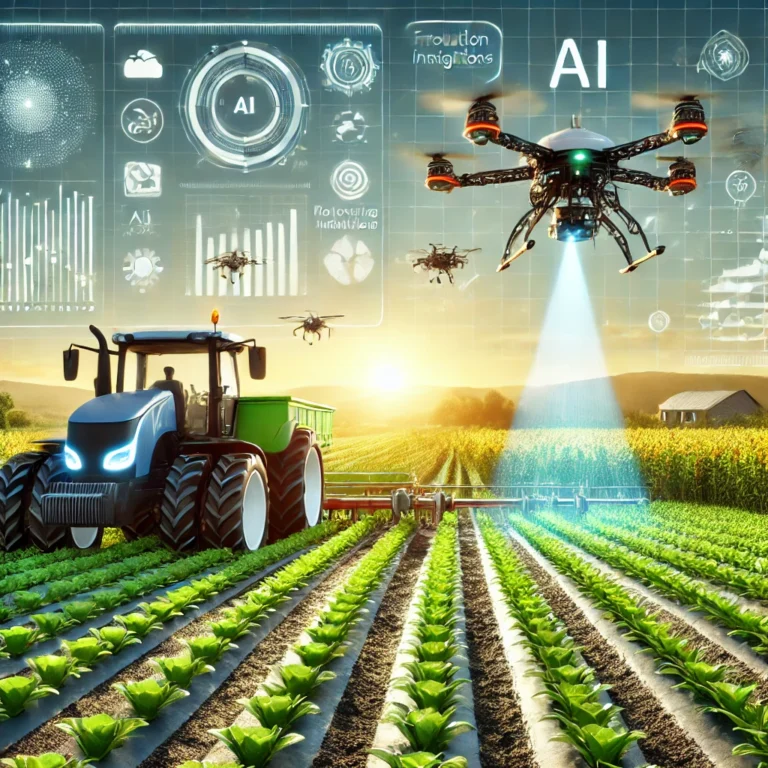Introduction to AI in Agriculture
Artificial Intelligence in Agriculture is revolutionizing the farming industry by enhancing efficiency, productivity, and sustainability. With the growing global population and increasing demand for food, AI in Agriculture has emerged as a game-changer, helping farmers make data-driven decisions, optimize resources, and improve crop yields.
The Role of AI in Agriculture
AI in Agriculture plays a crucial role in modernizing farming techniques by integrating advanced technologies such as machine learning, computer vision, and predictive analytics. From precision farming to automated irrigation systems, AI-driven solutions are reshaping the agricultural landscape.
Benefits of AI in Agriculture
The adoption of AI in Agriculture offers numerous benefits, including:
- Increased Efficiency: AI-powered automation reduces manual labor, allowing farmers to focus on strategic tasks.
- Enhanced Crop Yield: AI-driven analytics help monitor crop health and predict potential issues.
- Cost Reduction: AI minimizes resource wastage and optimizes input usage.
- Sustainability: AI promotes eco-friendly farming practices by reducing chemical usage and improving soil health.
- Risk Management: AI algorithms help predict natural disasters, market trends, and crop diseases to prevent major losses.
- Quality Control: AI ensures that agricultural products meet industry standards through automated sorting and grading.
Precision Farming

Precision farming is one of the most significant applications of AI in Agriculture. By leveraging AI-driven technologies, farmers can optimize their planting, irrigation, and fertilization processes. Key AI technologies used in precision farming include:
- Drones and Satellite Imaging: AI-powered drones monitor crop health, detect diseases, and analyze soil conditions.
- Smart Sensors: AI-based sensors collect real-time data on soil moisture, temperature, and nutrient levels.
- Predictive Analytics: AI algorithms predict weather patterns and potential risks, allowing proactive decision-making.
- Variable Rate Technology (VRT): AI enables precise application of fertilizers and pesticides based on soil and crop requirements.
AI in Agriculture: Automated Machinery
AI-driven automated machinery is transforming traditional farming methods by increasing efficiency and reducing human labor. Some notable AI applications in agricultural machinery include:
- Autonomous Tractors: AI-powered tractors can perform plowing, seeding, and harvesting tasks without human intervention.
- AI-Powered Harvesters: These machines use computer vision to identify ripe crops and automate the harvesting process.
- Robotic Weed Control: AI-enabled robots detect and eliminate weeds with precision, reducing the need for herbicides.
- Automated Greenhouses: AI optimizes climate control, irrigation, and lighting for indoor farming.
AI in Agriculture: Crop Monitoring and Disease Detection
Crop monitoring and disease detection are critical aspects of AI in Agriculture. AI-driven solutions help farmers identify diseases, pests, and nutrient deficiencies in crops using:
- Computer Vision: AI-based image recognition identifies crop diseases and pest infestations.
- Deep Learning Models: These models analyze vast datasets to detect anomalies in plant health.
- IoT-Enabled Devices: AI-integrated IoT sensors collect real-time data for early disease detection.
- AI-Based Pest Control: AI analyzes pest behavior and suggests eco-friendly control strategies.
AI in Agriculture: Smart Irrigation Systems
Water management is a major concern in agriculture, and AI-powered smart irrigation systems offer efficient solutions. AI in Agriculture helps in:
- Soil Moisture Monitoring: AI-based sensors track soil moisture levels and optimize irrigation schedules.
- Automated Drip Irrigation: AI algorithms control water flow based on crop requirements.
- Weather-Based Irrigation Management: AI predicts rainfall patterns to reduce water wastage.
- AI-Powered Water Recycling: AI optimizes water reuse in irrigation systems to enhance sustainability.
Supply Chain Optimization
AI in Agriculture is not limited to farming; it also plays a vital role in the agricultural supply chain. AI-driven solutions enhance:
- Demand Forecasting: AI predicts market demand, enabling farmers to plan their production accordingly.
- Inventory Management: AI optimizes storage and distribution to prevent food wastage.
- Logistics and Transportation: AI enhances route planning for efficient delivery of agricultural products.
- AI-Powered Market Insights: AI analyzes consumer trends to help farmers align their production with market needs.
- Blockchain Integration: AI and blockchain improve transparency and traceability in agricultural transactions.
Climate Change Adaptation

With climate change posing a serious threat to agriculture, AI is being utilized to develop adaptive farming techniques. AI in Agriculture helps in:
- AI-Based Climate Prediction Models: AI analyzes climate data to provide accurate weather forecasts.
- Drought Prediction: AI predicts drought conditions and suggests alternative farming strategies.
- Soil Erosion Monitoring: AI helps track and mitigate soil degradation caused by climate change.
- Carbon Footprint Reduction: AI aids in implementing sustainable farming practices to minimize environmental impact.
Challenges of AI in Agriculture
Despite its numerous advantages, AI in Agriculture faces several challenges, including:
- High Implementation Costs: The initial investment in AI-powered technologies can be expensive.
- Data Privacy Concerns: AI relies on vast amounts of data, raising privacy and security issues.
- Limited Technical Knowledge: Farmers need training to effectively use AI-driven solutions.
- Infrastructure Constraints: Lack of internet connectivity and electricity can hinder AI adoption in remote areas.
- Regulatory Barriers: AI adoption in agriculture is subject to government regulations and compliance standards.
- Resistance to Change: Traditional farmers may be hesitant to switch to AI-based methods due to cultural and financial factors.
Future of AI in Agriculture
The future of AI in Agriculture looks promising, with advancements in AI technologies set to further revolutionize the industry. Key trends include:
- AI-Powered Vertical Farming: AI will optimize indoor farming for year-round crop production.
- Blockchain Integration: AI and blockchain will enhance transparency in agricultural transactions.
- AI-Based Climate Prediction Models: AI will improve resilience against climate change.
- AI-Driven Livestock Management: AI will optimize animal health monitoring and breeding programs.
- Synthetic Biology and AI: AI will contribute to the development of genetically enhanced crops for higher yield and disease resistance.
- AI-Powered Food Security Solutions: AI will play a crucial role in addressing global food shortages through efficient farming techniques.
AI in Agriculture is transforming the farming industry by enhancing efficiency, productivity, and sustainability. From precision farming to automated machinery and smart irrigation, AI-driven solutions are revolutionizing traditional farming methods. While challenges exist, the future of AI in Agriculture holds immense potential for improving global food security and environmental sustainability. By embracing AI in Agriculture, farmers can optimize resources, reduce costs, and ensure sustainable agricultural practices for future generations. As AI continues to evolve, its integration into agriculture will become even more crucial in shaping the future of food production worldwide.
